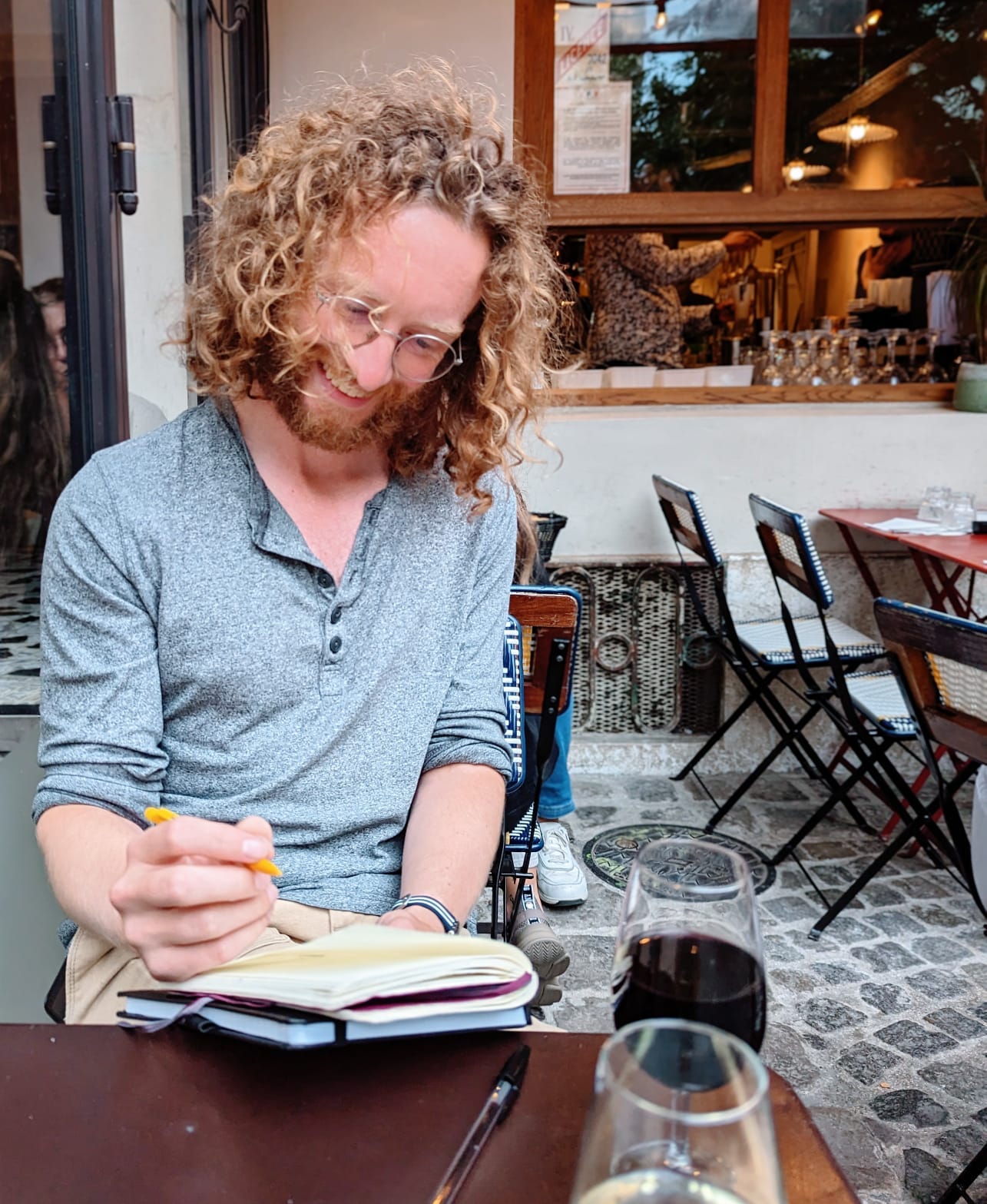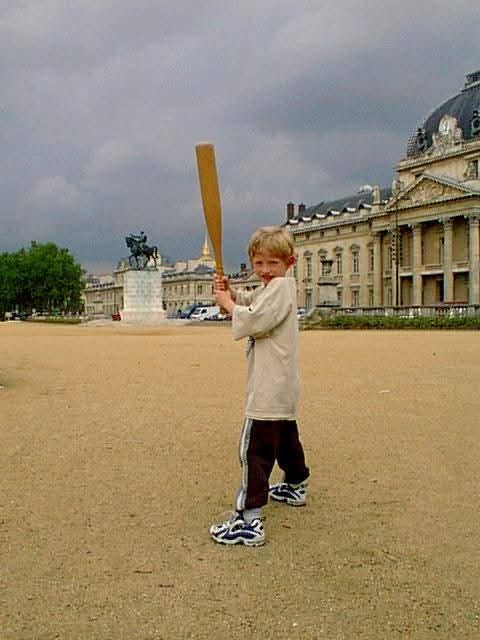Leaving America Questionnaire #7
Phineas Rueckert, journalist, 13th arrondissement
What drives Americans to leave home and settle elsewhere? That question has been on my mind for many years. This series, Leaving America, seeks to uncover the multitude of reasons and lessons learned—beginning with Americans in Paris. The questionnaire that follows will be the same for each guest. NOTE: want access to the insightful takeaways at the end? Become a paid subscriber. It also gives you full access to this newsletter’s archives!
I often wonder how my life would have unfolded if my physical exposure to France had begun earlier than late adolescence. Would I have chosen Paris? Would I have applied to university here, right from the start? Would it have changed anything other than create an even older and more enduring connection to the country? These are some of the questions that came to mind when I was reading about journalist and Becoming French author Phineas Rueckert’s experiences, below.
Where was the last place you lived in the U.S.?
Brooklyn, New York.
I was born in New York, and grew up between New York and Washington D.C. I spent childhood summers in Paris while my mom taught a study abroad course for Hunter College so I spoke the language and was introduced to French culture from an early age. After graduating from college in 2015, France was a natural choice for me. I moved to Toulouse, in the south of France, and taught English for a year as part of the TAPIF program. There, I saw a different part of the country and experienced France on my own for the first time. At the end of the school year, I returned to New York and worked for a couple of years, but my eyes were set on returning to France. Soon after, I applied to graduate school at Sciences Po, and in 2018, I moved here again– this time for good.
Did you intend to leave permanently or was the move temporary?
Technically, I moved to Paris for a two-year graduate school program, after which point I was supposed to move back to New York. But I think in my heart I knew that I wanted to stay in Paris; I was just in denial.
Was there a pivotal moment when you knew your life would be best pursued elsewhere?
I’ve recently been reading through old journals. In the summer of 2019, I had just spent a couple of months in New York for an internship at a local newspaper and had arrived back to Paris for my second year of graduate school. It was a difficult time for me. I had just ended a four-year relationship, and spent my summer couchsurfing in one of the most expensive cities in the world. I returned to Paris in early summer, and in that moment, I felt like the weight of my existence had shifted, away from the States and towards France. I wrote at the time: “We seem to have this misplaced notion that your real life has to be lived where you were born. For me, it doesn’t feel that way. My real life is where I [chose to live]…This whole summer, it was New York – and not Paris – that felt like the interlude.”
What sort of financial consideration did the move require, even if as a student initially? Does one need a plump savings account to make this work?
I moved to Paris with a few thousand dollars in savings, a few steady freelance gigs and an academic scholarship that significantly defrayed my university costs. The first year I lived at the Cité Universitaire in the 14th arrondissement and must have paid around 500 euros in rent. My window didn’t overlook the Seine, but the péripherique ring road, and I shared a kitchen with messy undergrads, so I was immediately dispelled of any romantic notions of life in Paris.
At what age did you leave? Looking back, was that too soon or too late?
I left New York a few weeks after my 25th birthday. I think it was the right time for me. Sometimes I wish I had moved to France for undergrad, but I’m happy to have had the traditional American liberal arts college experience (at Macalester College in St. Paul, Minnesota). I’m also glad I lived in New York for a couple of years as an adult. Throughout my life, Paris and New York have always been jostling one another for position. I recently saw an old high school friend, and she reminded me that as a teenager in DC I was always saying that my dream was to live in New York. New York gave me life skills, experiences and friendships I couldn’t have had in Paris, at a time (my early 20s) when I needed them, but towards the end I was gasping for air, exhausted by the noise, the dirtiness, the constant social life and the outrageous prices.
When did you know you'd made the right [or wrong] call?
I very vividly remember walking across the Pont de la Tournelle on one of those late August nights when I first arrived in 2018, looking down at the yellow lights of the city reflected onto the jet black river and feeling completely at peace in a way I never had in New York City or Washington D.C. In that moment I knew that I had made the right call.
In Paris, you can walk for an hour and end up in a different world, or a different century.
What does Paris offer you that your native home couldn’t and, perhaps, still can’t?
French people often scoff at me when I say this, but Paris offered me tranquility. I love that you can spend all afternoon at a café nursing a small coffee while reading a book. I love the parks and the quays of the river—these spaces where all of Paris life comes together. Paris is a walking city, and walking is how I process my thoughts. In the book I’m currently reading, Walking on the Ceiling by Ayşegül Savaş, the two main characters strike up a friendship and deal with grief over walks through Paris. In New York, you can walk for an hour and you’re still in the same neighborhood. In Paris, you can walk for an hour and end up in a different world, or a different century.
Can you share any anecdotes about your highest and lowest moments in Paris?
I haven’t spoken much about my day job, but I’ve worked as a journalist for the past five years at Forbidden Stories, a French journalism non-profit focusing on press freedom issues. For much of the spring of 2021, I worked on a top-secret investigation into spyware abuse. I couldn’t tell my partner, my parents or my friends about what I was working on for those months. In July 2021, we released the Pegasus Project a day before my 27th birthday. The investigation revealed how the phones of top French politicians, including Emmanuel Macron and several ministers, were allegedly tapped by the Kingdom of Morocco. That week was crazy for me: suddenly, our work was on the front page of Le Monde, The Washington Post, The Guardian, and so on. I was interviewed on both French and Indian national television. By the end of the week, my colleagues and I were sleep-deprived, exhausted, and unimaginably wired so we meandered down to the Seine on a Friday evening. It was the first real week of summer, and the first real summer since the COVID-19 lockdown, and an impromptu dance party was in full swing on the quays. We joined the party and danced until late in the night, feeling young and free for the first time in a long time.
That rambunctious energy contrasts with the months-long depression that was the previous winter. While France fully locked down between March and May of 2020, during the winter of 2020-2021, authorities installed a 6 p.m. curfew across Paris. Workplaces were open, but bars, restaurants, art galleries, and other cultural institutions were not. My partner and I would stand at her window on the rue de Charenton in the 12th—usually a bustling area—and stare out at the empty street while sometimes sharing a sad cigarette. While it was the perfect opportunity for catching up on EVERY SINGLE French cult film (Asterix & Obelix: Mission Cleopatra, La Chèvre, Les Bronzés Font du Ski, etc.) it wasn’t the stimulating, culturally rich Paris I had come to know and love.
Are there aspects of American life that you long for?
Apart from bagels, which is mostly a New York thing, I do miss the openness of America and Americans. I mean this in both a physical and an interpersonal sense. I went to college in the midwest, surrounded, to the south, by the golden cornfields and enormous skies of Iowa and, to the north, the endless pine forests of northern Minnesota. When I go back to the United States, I feel small. Sometimes, this smallness is overwhelming, but in other ways, it’s liberating: you can feel yourself expanding with the space.




